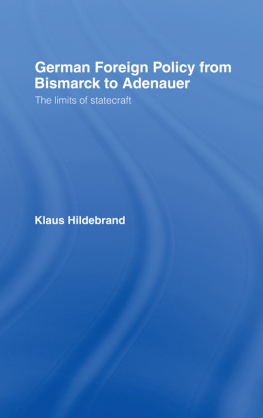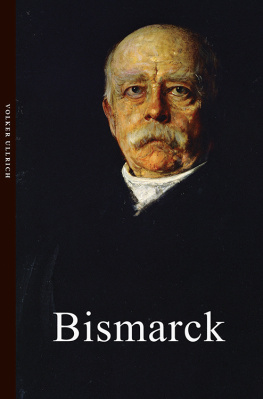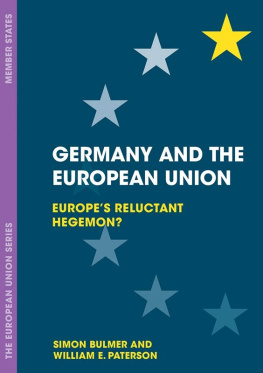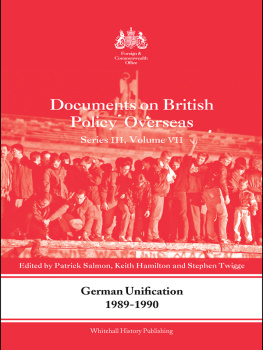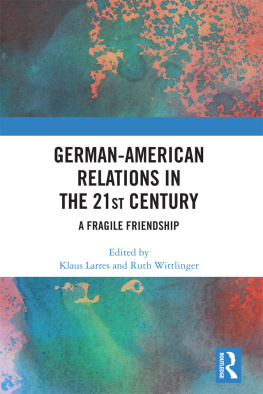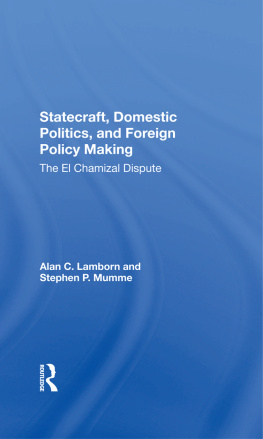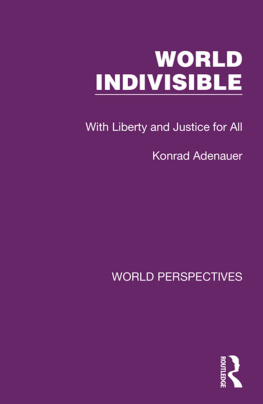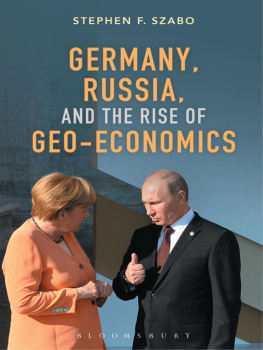GERMAN FOREIGN POLICY
FROM
BISMARCK TO ADENAUER
TITLES OF RELATED INTEREST
Bismarck Volume 1
Lothar Gall, translated by J. A. Underwood
Bismarck Volume 2
Lothar Gall, translated by J. A. Underwood
From Kaiserreich to Third Reich
Fritz Fischer, translated by R. A. Fletcher
From Unification to Nazism
Geoff Eley
Notables of the right
James N. Retallack
Peasants and lords in modem Germany
edited by Robert G. Moeller
The policies of genocide
edited by Gerhard Hirschfield for The German Historical Institute
Populists and patricians
David Blackbourn
Rethinking German history
Richard J. Evans
Revisionism and empire
Roger Fletcher
The Third Reich
Klaus Hildebrand, translated by P. S. Falla
We men who feel most German
Roger Chickering
The Weimar Republic
Ebhard Kolb, translated by P. S. Falla
GERMAN FOREIGN POLICY
FROM
BISMARCK TO ADENAUER
The limits of statecraft
KLAUS HILDEBRAND
Translated by Louise Willmot
Klaus Hildebrand 1989
this translation Routledge 1989
This book is copy under the Berne Convention. No
reproduction without permission. All rights reserved.
First published in 1989 by Routledge
Reprinted 2002
by Routledge
2 Park Square, Milton Park,
Abingdon, Oxon, 0X14 4RN
Transferred to Digital Printing 2007
Routledge is an imprint of the Taylor & Francis Group
British Library Cataloguing in Publication Data
Hildebrand, Klaus
German foreign policy from Bismarck to
Adenauer: the limits of statecraft.
1. West Germany. Foreign relations, history
1. Title
327.43
ISBN 0-04-445070-2
Library of Congress Cataloging-in-Publication Data
Hildebrand, Klaus.
[Staatskunst oder Systemzwang. English]
German foreign policy from Bismarck to Adenauer: the limits of statecraft / Klaus Hildebrand; translated by Louise Willmot.
p. cm.
Translation of: Staatskunst oder Systemzwang.
Bibliography: p.
Includes index.
ISBN 0-04-445070-2
1. GermanyForeign relations1871. 2. Germany (West)Foreign relations. 3-Bismarck, Otto, Furst von, 18151898. 4. Adenauer, Konrad, 18761967. I. Title.
DD221. H5713 1989
327.4309034--dc20 89-5693
CIP
Publishers Note
The publisher has gone to great lengths to ensure the quality of this reprint but points out that some imperfections in the original may be apparent
, The crisis of July 1914: The European security dilemma. Observations on the outbreak of the First World War, first appeared as Julikrise 1914: Das europische Sicherheitsdilemma. Betrachtungen ber den Ausbruch des Ersten Weltkrieges, in Geschichte in Wissenschaft und Unterricht 36 (1985), pp. 469502 published by Klett-Verlag of Postfach 809, 7000 Stuttgart 1.
, The German Resistance and its proposals for the political future of Eastern Europe, first appeared as Die ostpolitischen Vorstellungen ini deutschen Widerstand, in Geschichte in Wissenschaft und Unterricht 29 (1978), pp. 21341, published by Klett-Verlag, Postfach 809, 7000 Stuttgart 1.
, The German Eigenweg. On the problem of normality in the modern history of Germany and Europe, first appeared as Der deutsche Eigenweg. ber ein Grundproblem der europischen und deutschen Geschichte im 19. und 20.Jahrhundert, and was published in Festschrift fr Karl-Dietrich Bracher, ed. M. Funke, H.-A. Jacobsen, H.-H. Kntter, H.-P. Schwarz (1987).
Tackling the problem of Germanys role in the history of world politics in the nineteenth and twentieth centuries is one of the most interesting tasks of historiography. Furthermore, the relationship between Britain and Germany is of central significance in understanding this role. In the first section of this book, dealing with the history of the international order between German unification in 1871 and the outbreak of the First World War in 1914, the issue is investigated in three ways. One chapter describes British-Prussian negotiations over military disarmament in Europe in the period immediately before the Franco-Prussian War of 18701. Another provides detailed examination of the British attitude towards German unification, an event of profound significance in modern European history. In this context, particular attention is devoted to an issue which had an enormous impact on the future development of international relations the compatibility of the new German Reich with the existing European order of states. The problem is then examined in greater depth in the following chapter, which traces the history of Anglo-German relations until the outbreak of the First World War. Finally, and widening the scope beyond the relationship between Britain and Germany, a further chapter is devoted to an investigation of the security dilemma which haunted all the European powers during the years before the First World War and in the crisis of July 1914, and which culminated in what George F. Kennan has described as the great seminal catastrophe of this century.
The conflict of the nations between 1914 and 1918 had a revolutionary effect on the existing international and social order. It was followed by a wholly understandable desire to eliminate the evils of continual war once and for all, and to establish a stable and lasting peace. However, it rapidly became clear that the course being taken by the world which had developed in the postwar years was the opposite of what had been intended. The totalization of conflict, in which war was waged by peoples and societies rather than by cabinets and states as in earlier times, introduced an age of wars and revolution.
Hitlers Germany was the special representative and most radical protagonist of this new era. The dictators foreign policy towards France, the nation which embodied the status quo established in the Paris peace agreements of 191920, is the theme of the chapter which opens the second section of this book. The next deals with the condition and development of the system of states in the years between 1931, when Japan began its conquest of Manchuria, and 1941, when the United States of America entered the war. During this period the international order was characterized by a complex mixture of peace and war. and the destruction of that order is analysed from a universal point of view. The section is concluded by a detailed investigation of the proposals of the German Resistance for the political future of eastern Europe. This chapter also offers an opportunity for the analysis of Hitlers own political and radical goals, to be achieved at the expense of the Soviet Union and east central Europe. At the centre of the analysis there is a description of the unmistakable similarities and the fundamental differences between national socialism and conservatism, between the dictator and the conspirators of 20 July 1944.
Two chapters in the last section of the book reveal the fundamental change in Germanys position in world politics after the caesura of 1945. Specifically, these deal with the relationship of the Federal Republic of Germany with the powers on the flanks of the continent, the French great power and the Soviet world power They also reflect the persistent fear of the aged Konrad Adenauer about a renewed co-operation between the victors of the war, to the detriment of the young and insecure Bonn republic.

